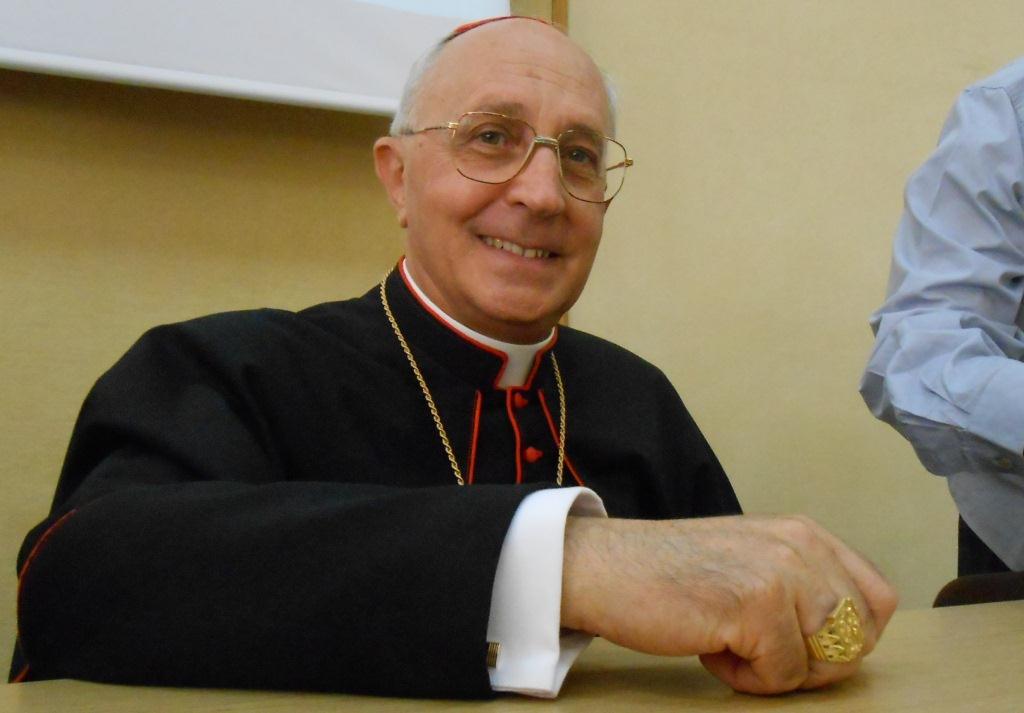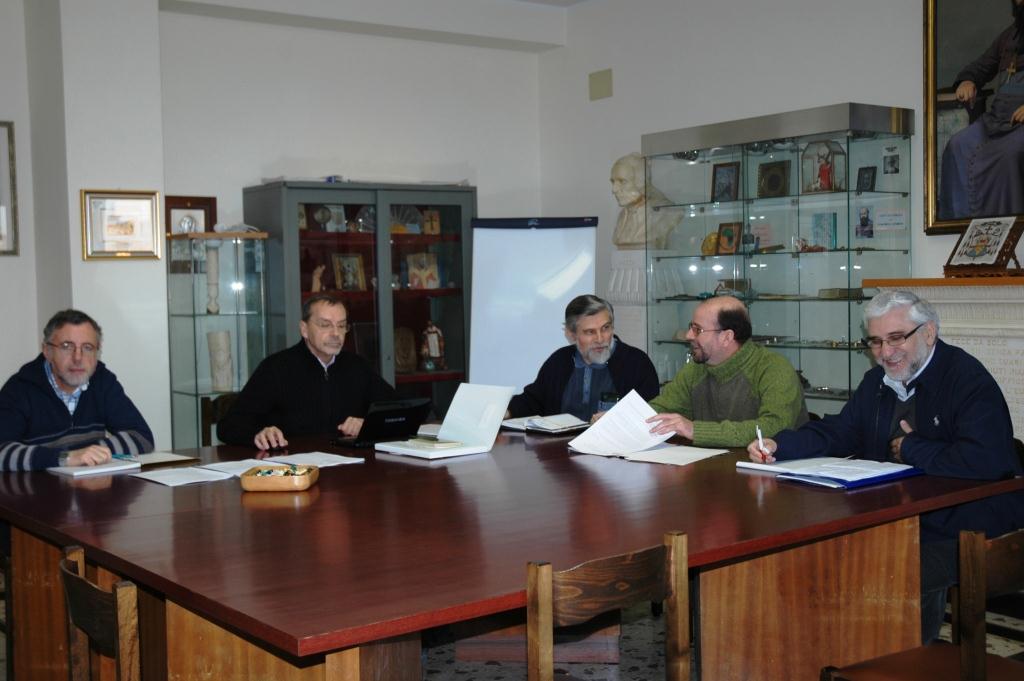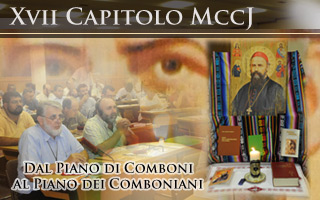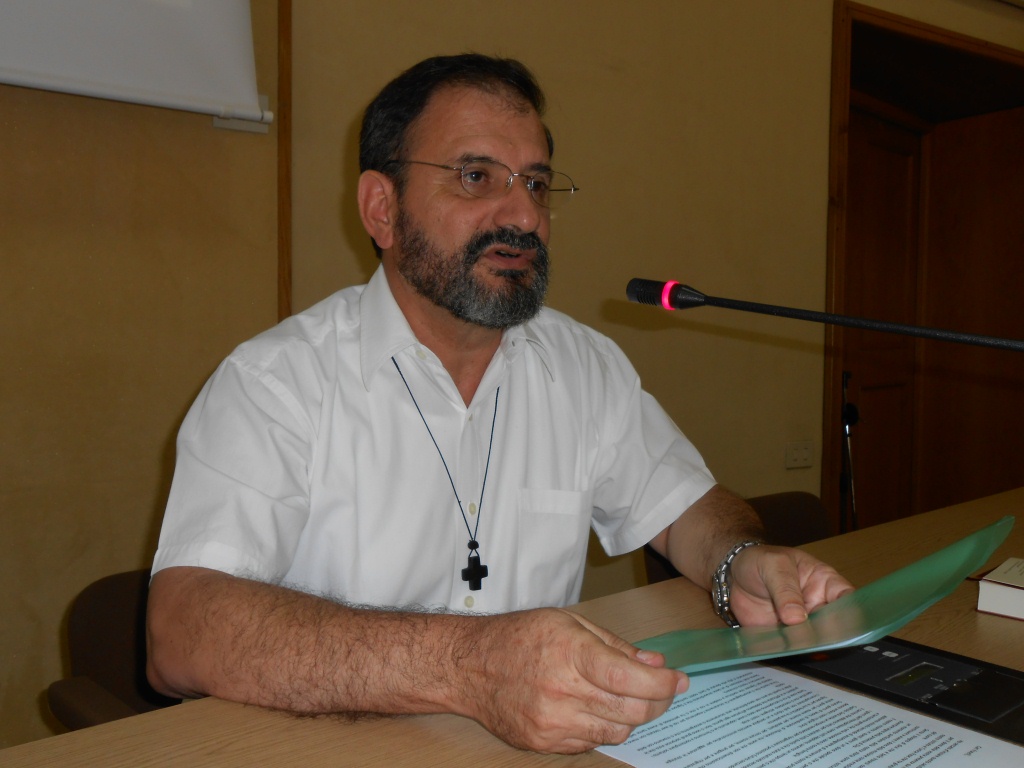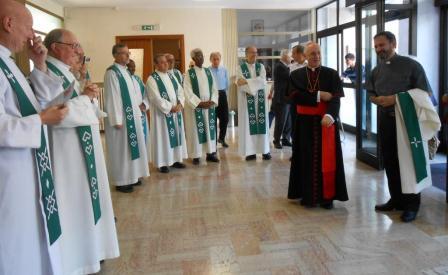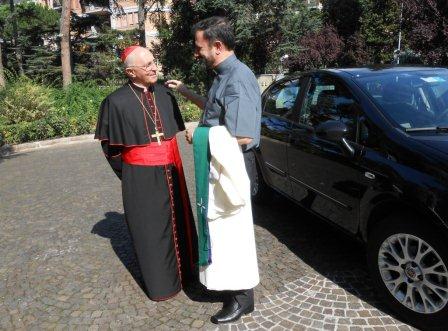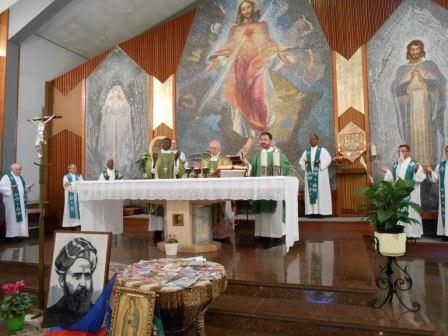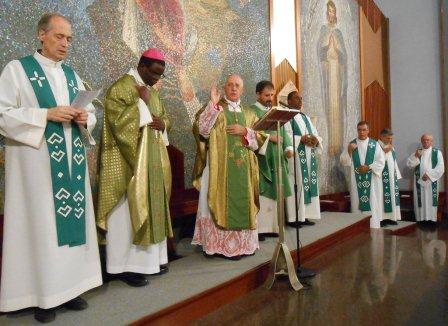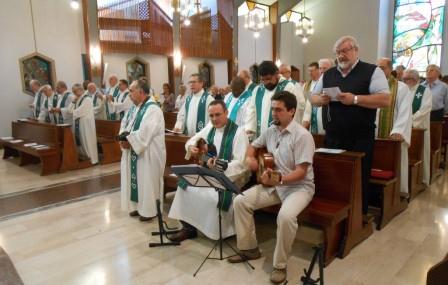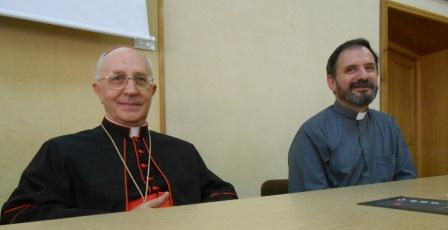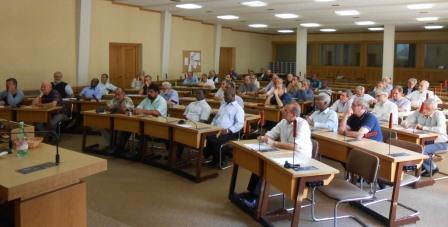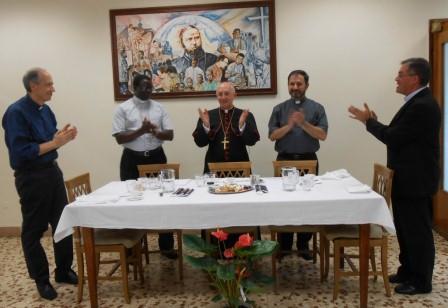Daniel Comboni
Comboni Missionaries
Institutional area
Other links
Newsletter
Rome, Monday 17 September 2012
Cardinal Fernando Filoni, Prefect of the Congregation for the Evangelization of Peoples, yesterday visited the Comboni Missionaries at their Intercapitular Assembly being held in Rome from 2 to 22 of September. His Eminence presided over the Eucharist, followed by a brief meeting with the missionaries in the chapter hall, where the superior general, Fr Enrique Sánchez G., welcomed the Cardinal.
Sunday, September 16. “This world is passing, the centuries are passing, only those who love will never pass” are the words of the opening song at the Eucharist presided over by Cardinal Fernando Filoni in the chapel of the Comboni Missionaries, meeting for the Intercapitular Assembly in Rome. The celebration was attended, in addition to the provincial and delegate superiors, also by Sanctus Lino Wanok, Bishop of the diocese of Nebbi, Uganda, and friends of the Comboni Missionaries who live in the area around the General House.
After listening to the Word of God, Cardinal Filoni shared his reflection based in a particular way on three passages found in the book of the prophet Isaiah (50,5-9) who speak of the acceptance of the suffering Servant of the Lord: “The Lord has opened my ear. For my part I made no resistance. The Lord comes to my help. My vindicator is here at hand.”
According to Cardinal Filoni, this is “a good example of availability, trust and confidence in a God who does not leave us alone or abandoned. A mission where there is no loneliness. So an example that we should imitate, in the certainty that – even if it seems contrary to normal human tendencies – the Lord will do us justice. The same justice that has and will make Jesus Christ victorious. This is the strength of the Christian faith, as confirmed by the passage in Mark: ‘Whoever loses his life for my sake and the sake of the gospel, will save it’.”
“Everything is really accomplished in the person of Jesus – said Cardinal Filoni. Isaiah’s words are a clear reference to the passion of Christ. The ‘Servant of God’ of Isaiah is fulfilled in Jesus’ words, as Mark says: ‘If anyone wants to be a follower of mine, let him renounce himself and take up his cross and follow me’.”
In conclusion, Cardinal Filoni said that “by truly listening to the Word of God and by insistent prayer we can have the same way of thinking and acting, and so we too can proclaim to others the Word of life which is a Word of eternal life.”
After the Eucharist, there was a short meeting with the missionaries in the chapter hall, where the superior general, Fr. Enrique Sánchez G., welcomed the Cardinal Filoni and thanked him for having accepted the invitation of the Comboni Missionaries. “We are all pleased to have His Eminence among us. An authority in such an important Congregation of the Church, Propaganda Fide, which we acknowledge and obey. Our deep desire continues to be one for the mission, that is, for evangelization. We want to continue to be present even where the mission is not easy.” Cardinal Filoni thanked for “all the work that the Comboni Missionaries are doing in the territories under the jurisdiction of the Congregation for the Evangelization of Peoples.”
The brief intervention of Cardinal Filoni was followed by question time. There were questions, among others, about the selection of bishops among the religious and about situation of the Church in Sudan and South Sudan. The meeting with the missionaries was concluded with a fraternal meal together.
***
Cardinal Fernando Filoni
Born 66 years ago in Manduria, Puglia, Cardinal Filoni is a long-time diplomat. Prior to joining the Secretariat of State in 2007, he had been Nuncio in the Philippines and, before that, from 2001 to 2006, in Iraq. He is one of the few diplomats who remained in the country to face the bombings of the U.S.A. military intervention. From 1992 to 2001, he was the cultural counsellor at the Nunciature in the Philippines, a seemingly secondary role that allowed him, in fact, to follow from Hong Kong the thorny affairs of the Church in China. Card. Filoni has taken the place of the Indian Cardinal Ivan Dias, who has reached retirement age. A supporter of the Neo-catechumenal movement, Archbishop Filoni was called to Rome by the Vatican Secretary of State Tarcisio Bertone.
On 10 May 2011 he left the leadership of the first section of the Vatican Secretariat of State and was appointed by Pope Benedict XVI Prefect of the Congregation for the Evangelization of Peoples. With this appointment, he has become the head of one of the most important departments of the Roman Curia. He was made a cardinal in the Consistory of 18 February 2012.
Congregation for the Evangelization of Peoples
Started in the seventeenth century, the Congregation for the Evangelization of Peoples handles nearly 40 per cent of the dioceses of the Catholic Church worldwide. Under his administration fall almost all the dioceses in Africa, Asia and Oceania.
Art. 1 — The Roman Curia is the complex of dicasteries and institutes which help the Roman Pontiff in the exercise of his supreme pastoral office for the good and service of the whole Church and of the particular Churches. It thus strengthens the unity of the faith and the communion of the people of God and promotes the mission proper to the Church in the world.
Historically known as De Propaganda Fide, is one of the departments that makes up the Roman Curia, namely “all of the departments and organisations which help the Roman Pontiff in the exercise of his supreme pastoral office for the good and service of the whole Church and of the particular Churches. It thus strengthens the unity of the faith and the communion of the people of God and promotes the mission proper to the Church in the world”, according to the definition of Pope John Paul II in the first number of the Apostolic Constitution Pastor Bonus.
The foundation of the Congregation “de Propaganda Fide” has been, for the Church, an important growth in the awareness of their inalienable call to proclaim Christ, the only Saviour of the world, and therefore having to drive, stimulate and organize all the forces available so that this saving proclamation may reach all nations.
The Congregation of Propaganda Fide has an extensive administrative autonomy and manages an independent budget from the Administration of the Patrimony of the Apostolic See. A Cardinal is responsible for handling this budget.

